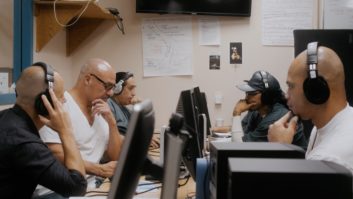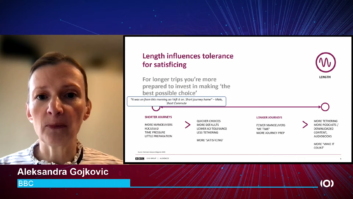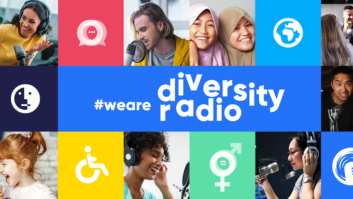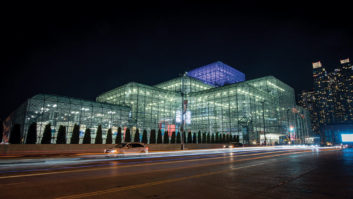
Cameron Esposito, talking with comedian Andy Kindler.
Credit: Photo: Liezl Estipona When it comes to podcasts — often defined as on-demand audio content — the only limitation is imagination. With relatively low barriers to entry in terms of cost and often production, the podcast is an incubator for creativity and a means of broadening the reach of your audience, or finding one for something new.
Listeners subscribe to podcasts through iTunes and apps like Stitcher. Used by major radio stations and one-man-bands operating out of their garage alike, it’s something of an equalizer in terms of a platform to engage with listeners.
The substance and format of podcasts can vary greatly, from one person talking about serious news to a bevy of characters mulling over inane things like the worst in recent film (for that topic check out “The Flop House”).
Radio World caught up with some of the folks behind three different and successful podcasts to talk about what it takes to thrive in this space and the science behind their artistic choices.
The three shows — “Welcome to Night Vale,” “Put Your Hands Together” and “Radiolab” — could scarcely be more distinct from one another, but they share some overarching similarities, the most significant of which is that they are novel and niche.
STORYTIME
“Welcome to Night Vale,” which could be described as a kind of “Lake Wobegon” meets “The Twilight Zone,” is a bi-monthly narrative account of the strange happenings of a small desert town. Or, in the words of writer Joseph Fink, it’s a place where all conspiracy theories are true. It’s framed as a radio news show but actually produced independently by Fink, co-creator Jeffrey Cranor and the narrator Cecil Baldwin.
Launched in June of 2012, “Night Vale” shot past public radio giant “This American Life” over the summer to become, temporarily, the number one podcast on iTunes. That list tends to fluctuate a lot, but “Night Vale” has gone on to be a consistent fixture in the top 10. Neither Cranor nor Fink claimed to have engineered such an overwhelmingly positive response, but they do think being unique is an important part of it.
It’s essential to have “an idea behind it that’s specific and new,” Fink says. “‘This is a podcast about X, and everything is about that.’” Part of that is being a fan first, Fink says. “Listen to a lot of podcasts; see what people are doing.”
HA HA POWER
Cameron Esposito, host of the comedy podcast “Put Your Hands Together,” wanted to get more bang for her buck with the show she puts on at the Upright Citizens Brigade theater in Los Angeles every Tuesday. So she repurposes it as a podcast. While there is a lot of competition in the comedy podcast space, she believes hers was the first one to distribute a live stand-up routine.
“The future of standup is more niche-oriented,” Esposito said, who refers to her own particular brand as “alternative,” meaning that it’s less of a “strict set up and punch lines” and more “personal stories.” The podcast has increased her visibility leading to fan support in places like Kansas City, Kan., Esposito says, that might otherwise never heard of her.
Esposito recently landed her first appearance on a late-night talk show on Craig Ferguson.
IT’S SCIENCE
What started back in 2003 as a segment with Jad Abumrad as a curator of documentaries has morphed into the popular podcast “Radiolab.” Today, the show combines dialogue with co-hosts Abumrad and Robert Krulwich with sound as narrative to address deep philosophical questions about science and the human experience. It’s produced by WNYC(FM), syndicated on 450 NPR stations and downloaded by some 4 million people every month.
“A lot of production uses voice and reporting but doesn’t use sound the way we were interested in,” Radiolab producer Ellen Horne said of the concept. “We sort of felt nobody else was doing this.” Instead of simply running a 10-second sound clip like others might do, “Radiolab” uses sound in a theatrical way. A story that takes place in a freezing environment might include the sound of ice cracking, for example.
It’s a fine line, though, between artful and gimmicky, Horne cautions. They experimented for a while before developing the format they use today.
The fact that all three shows bring something new to the genre isn’t the only thing these podcasts have in common; they also all do, or have done, live shows in front of an audience, and are consistent in their distribution of the podcast to listeners. The latter, they say, is crucial.
“You have to have something that your audience can predict,” Esposito says, they need to know “when it’s coming out and what it’s going to sound like.”
SHOW ME THE MONEY
Podcasts may not be a get-rich-quick scheme, but they can be monetized.
“Radiolab” has sponsors, and “Night Vale” makes some money off of show merchandise. Both also take donations. When it comes to sponsorship, “Night Vale” isn’t ruling that out, but is cautious about doing anything that would interrupt their storytelling format. Esposito describes “Put Your Hands Together” as a passion project, given that it’s not making any money at the moment, but maintains that it pays dividends anyways.
“Having a diversified presence on the Internet is just as valuable as actually generating revenue,” Esposito said.
It needn’t cost much to get in the game. The microphone “Night Vale” uses to record cost $60 and Liberated Syndication hosts their podcast for only $20 a month.
As far as the brains behind these three operations are concerned, the future of podcasts is bright.
“It’s a great way to hone your skill without a ton of risk,” Esposito said. Under the right circumstances, it can be “a sandbox of creativity for your staff,” Horne said.
Fink encourages people to consider the podcast as a worthy genre in and of itself.
“At the moment, podcasting is sometimes seen as the step to something rather than the end itself,” Fink said. “I think of it as an end in itself; done right, it’s an art form.”
Eliza Krigman interviewed NPR Vice President & General Manager of Digital Services Robert Kempf in Radio World’s recent eBook “Streaming for Radio Broadcasters.” Seeradioworld.com/ebooks.












